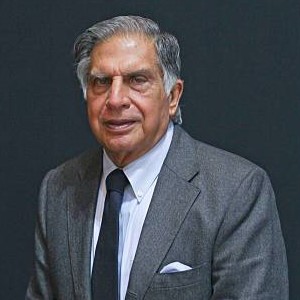A Legacy of Leadership: Shaping Industries and Inspiring Generations
 “The true measure of success is not just in what you achieve, but also in how you impact others positively,” – Ratan Tata.
“The true measure of success is not just in what you achieve, but also in how you impact others positively,” – Ratan Tata.
Ratan Tata was born on December 28th, 1937 in Mumbai India, into one of the country’s most prominent industrial families. He was the great-grandson of Jamsetji Tata who was the founder of Tata Group. Ratan was instilled with the importance of integrity, innovation, and social responsibility. While he grew up in a household that valued education and philanthropy, his family background provided him with early exposure to the world of business & entrepreneurship.
He pursued his undergraduate degree in Architecture from the renowned Cornwell University in the US, after completing his schooling at the prestigious Campion School, in Mumbai. He furthered his studies and pursued a management degree from Harvard Business School. And, this blend of architectural insight with business acumen equipped Ratan Tata with a unique perspective that would prove invaluable in his later career.
“He (Ratan Tata) was an architect with a degree from Cornell University, New York, and had used his architecture skill in designing the house in Circuit House Area in Jamshedpur,” Former Tata Steel deputy managing director T. Mukherjee said.
“I purchased my portion in 2007. I liked the design as it has open spaces, enough light, and places to sit out,” Mukherjee recalled.
Early Career
Ratan Tata’s early career started in the year 1961 at the Tata Group. He was assigned to the Tata Steel Division, where he engaged in various roles and this included overseeing the construction of a new plant in Jamshedpur.
Ratan Tata took the helm as the Chairman of the Tata Group in 1991, succeeding J. R. D Tata. For the conglomerate, this was a move that marked the start of a transformative era. The Tata Group underwent major transformation under the leadership of Ratan Tata which propelled it into the global arena. He envisioned a company that was not just a leader in our country but a formidable player on the global stage.
The company touched new heights as it witnessed numerous international as well as domestic deals under his leadership. Although Sir Ratan Tata was initially opposed by many when he suggested that the company should global, under his leadership and guidance, Tata now owns big international brands. Some of the major deals signed during his era include the acquisition of Tetley Tea in 2000, acquisition of Daewoo Commercial Vehicles in 2004, acquisition of the Ritz-Carlton Boston Hotel and the acquisition of Brunner Mond in 2006, acquisition of Corus Steel and acquisition of NatSteel in 2007, acquisition of Jaguar Land Rover in 2008, Joint venture with Star Bucks in 2012, reacquisition of Air India, Acquisition of Big Basket and 1 MG in 2021.
Ratan Tata believed in the power of hard work and one of his famous quotes reflects this ideology. “I don’t believe in taking the right decisions. I take decisions and then make them right,” Mr Tata once said.
A Beacon of philanthropy & corporate responsibility
Despite being an influential personality Mr Tata remained humble throughout his life. An instance that proves this is that he was often spotted sitting next to his driver in the car. “No Nobel Laureate says that he or she has won a Nobel! So be humble,” said Mr Ratan Tata once.
He believed that businesses should not only focus on profits but also give back to society. He was known for his philanthropic works – be it supporting causes like education and healthcare, or financially supporting his 80 employees and their families who were affected by the 26/11 Mumbai attacks.
In his official statement, Tata Sons chairman N Chandrasekaran said Ratan Tata was a “truly uncommon leader whose immeasurable contributions have shaped not only the Tata Group but also the very fabric of our nation”. He said Tata was more than a chairperson for the Tata Group, and was a “mentor, guide and friend” to him.
Ratan Tata is not just a name associated with one of India’s most iconic business empires; he represents a legacy of integrity, philanthropy, and corporate responsibility. “Why I found him to be unique among the businessmen is the fact that he was competent, humble, courteous, curious, concerned, and patriotic,” N R Narayan Murthy, Founder of Infosys said.
His legacy extends beyond the Tata Group, influencing businesses across India and beyond to prioritize ethical practices and community engagement. Through his unwavering dedication to social causes, Ratan Tata has demonstrated that businesses can thrive while making a meaningful impact on society. As the world faces complex challenges, his vision and leadership serve as an enduring reminder of the transformative power of corporate responsibility and philanthropy.

